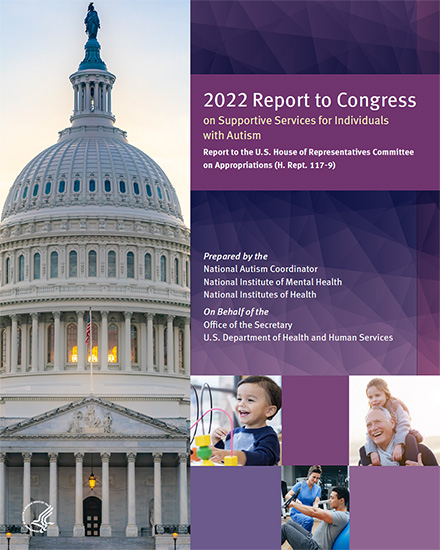November 29, 2023 | For Immediate Release
HHS Releases the 2022 Report to Congress on Supportive Services for Individuals with Autism

The U.S. Department of Health and Human Services (HHS) has released the 2022 Report to Congress on Supportive Services for Individuals with Autism. This report was requested by the U.S. House of Representatives Committee on Appropriations in House Report 117-96. It describes supportive services that, in addition to healthcare services, may be beneficial for improving outcomes for autistic individuals and their families. Autistic individuals can have complex medical, behavioral, educational, and social service needs. Because the combination and degree of characteristics can differ greatly from one individual to another and change over the lifespan, there are many diverse service needs across the autism community. These include, but are not limited to:
- Mental and Behavioral Health Interventions, Services and Supports
- Assistive Technology, Specialized Medical Equipment, and Associated Services and Training
- Technology-based Interventions and Supports Interventions
- Academic Services and Supports
- Occupational, Physical, and Sensory Integration Therapy
- Support, Social, and Community Groups
- Empowerment, Education, and Advocacy Training and Services
- Employment Services, Vocational Rehabilitation Services, and Job Coaching
- Family and Caregiver Supports
- Home and Community-Based Services and Supports
- Family/Systems Navigation
The current evidence base and federal coverage policies for these and other services and supports are summarized in the report. In addition, the report provides an overview of activities and programs related to supportive services conducted by multiple federal departments and agencies, including agencies and offices within HHS, as well as the Departments of Defense, Education, Housing and Urban Development, Justice, Labor, Transportation, and Veterans Affairs, and the Social Security Administration.
The report highlights needs and opportunities for strengthening supportive services for individuals with autism. There are several critical areas of need, including long waitlists for services; the "services cliff" experienced after high school; workforce shortages; services for older adults; as well as racial, ethnic, and geographic disparities in access to quality autism services and care. Additionally, the report discusses how opportunities such as the expansion of telehealth and availability of family navigation tools and services can assist with the complexity of obtaining supportive services and coverage. The report also discusses how establishing and strengthening the evidence base demonstrating efficacy for services that individuals currently use and find helpful for addressing co-occurring conditions will be essential to support coverage of these services.
Coordination of federal autism activities and engagement with service providers and the autism community is achieved through avenues such as the Interagency Autism Coordinating Committee (IACC) and the activities of the National Autism Coordinator. This helps to ensure that federal departments and agencies are responsive to the evolving needs of the community in their efforts to continuously enhance supportive services for people on the autism spectrum and their families.
This report was prepared by the HHS National Autism Coordinator and the Office of National Autism Coordination (ONAC) at the National Institutes of Health on behalf of the Office of the HHS Secretary, with contributions from multiple federal departments and agencies.


